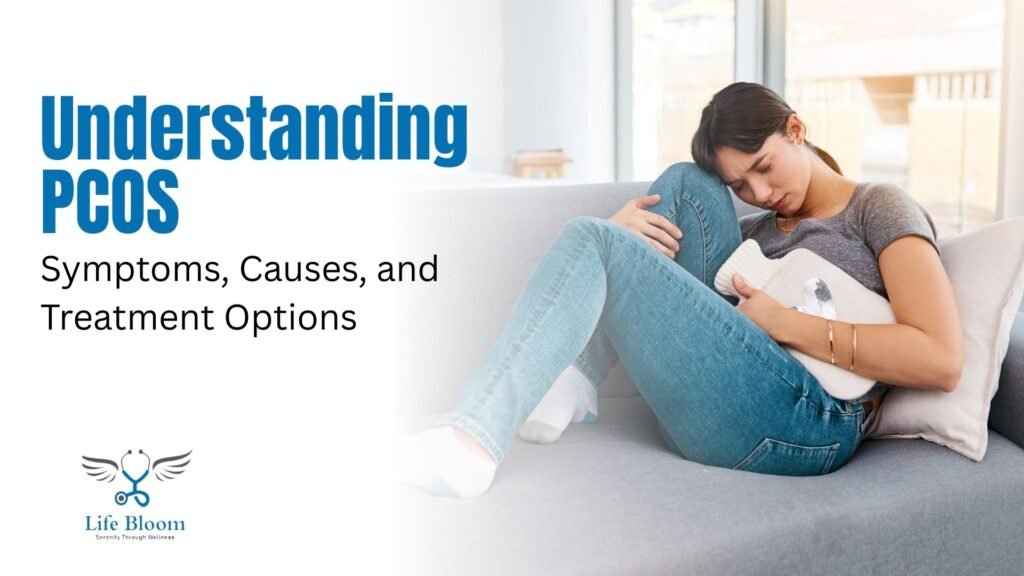Polycystic Ovary Syndrome (PCOS) is a common hormonal disorder that affects millions of women worldwide. It is one of the leading causes of infertility and can also contribute to various long-term health issues. Understanding its symptoms, causes, and treatment options can help women take control of their health.
What is PCOS?
PCOS is a condition that affects the ovaries and leads to hormonal imbalances. Women with PCOS often have higher-than-normal levels of androgens (male hormones), which can cause various health issues. The condition also affects insulin levels and ovulation, leading to irregular menstrual cycles and other complications.
Common Symptoms of PCOS
The symptoms of PCOS can vary from woman to woman, but some of the most common include:
Irregular Periods: Skipped, infrequent, or prolonged menstrual cycles.
Excessive Hair Growth (Hirsutism): Unwanted hair growth on the face, chest, and back.
Acne and Oily Skin: Due to an overproduction of androgens.
Weight Gain and Difficulty Losing Weight: Insulin resistance can contribute to weight gain.
Hair Thinning or Hair Loss: Similar to male-pattern baldness.
Dark Patches on Skin: A sign of insulin resistance.
Difficulty Getting Pregnant: Due to irregular ovulation or lack of ovulation.
Causes of PCOS
The exact cause of PCOS is unknown, but several factors contribute to its development:
Hormonal Imbalance: Increased levels of androgens disrupt normal ovulation.
Insulin Resistance: The body’s cells do not respond properly to insulin, leading to high blood sugar levels and increased androgen production.
Genetics: PCOS often runs in families, suggesting a genetic link.
Inflammation: Low-grade inflammation has been associated with increased androgen production.
Health Complications Linked to PCOS
PCOS is not just a reproductive issue; it can also lead to long-term health complications such as:
Type 2 Diabetes
High Blood Pressure
Heart Disease
Sleep Apnea
Depression and Anxiety
Endometrial Cancer
Treatment Options for PCOS
While there is no cure for PCOS, managing symptoms and improving overall health is possible through lifestyle changes and medical treatments:
1. Lifestyle Changes
Healthy Diet: A balanced diet rich in whole grains, lean proteins, healthy fats, and fiber can help regulate insulin levels.
Regular Exercise: Helps with weight management and improves insulin sensitivity.
Stress Management: Practices like yoga, meditation, and adequate sleep can help balance hormones.
2. Medications
Birth Control Pills: Help regulate menstrual cycles and reduce androgen levels.
Metformin: Used to improve insulin sensitivity.
Anti-Androgen Medications: Reduce excessive hair growth and acne.
Fertility Treatments: Such as Clomid or Letrozole for women trying to conceive.
3. Natural Remedies
Herbal Supplements: Some studies suggest spearmint tea and cinnamon may help balance hormones.
Vitamin D and Omega-3s: Essential for reproductive and metabolic health.
When to See a Gynecologist
If you experience irregular periods, excessive hair growth, difficulty losing weight, or trouble conceiving, consult a gynecologist for early diagnosis and treatment. Early management can help prevent long-term complications and improve quality of life.
Conclusion
PCOS is a manageable condition with the right approach. Understanding its symptoms and causes can help women seek timely medical advice and make necessary lifestyle changes. If you suspect you have PCOS, don’t hesitate to reach out to a healthcare professional for guidance and support.

